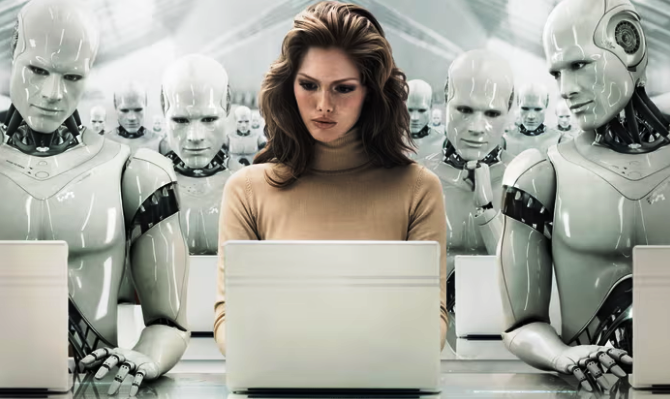Secure your Data with Inferno🔥, Use Code: INFERNO100
Why Regulating AI is Super Important: Keeping Things Safe and Fair
Explore the importance of regulating artificial intelligence (AI) to ensure its safe, fair, and ethical use. We go deep into how regulations can prevent harmful outcomes, protect against cyber threats, and address biases in AI systems. Additionally, the article also highlights the role of regulations in mitigating job displacement, promoting innovation, and fostering global cooperation.
DEVELOPMENT AND ECONOMIC THREATS EVOLVING TECH
Phillemon Neluvhalani
5/23/20244 min read


I think by now it's safe to say ...AI is no longer just a sci-fi dream—it's here and it's everywhere. From self-driving cars to smart home devices and even the apps on our phones, AI is changing the way we live, work, and play. But with all this cool tech comes some serious responsibilities. We need to make sure AI is safe, fair, and doesn't go off the rails. Let's dive into why regulating AI is so important and how it can help us make the most of this incredible technology.
Lets Avoid Disasters ,Imagine a world where self-driving cars are everywhere, but they haven't been properly tested. Scary, right? Without proper regulation, there's a huge risk of accidents and malfunctions. The same goes for AI in healthcare—if a robot surgeon makes a mistake or an AI misdiagnoses a condition, the consequences could be dire. Regulations ensure these technologies are safe before they become part of our everyday lives.
AI can be a hacker's dream if it's not well-protected. Cybercriminals can exploit weaknesses in AI systems to steal data or cause havoc. By setting up strict security standards, regulations can help protect our information and keep AI systems secure from attacks.
Being Fair and Ethical
Fighting Bias
AI systems learn from data, and if that data is biased, the AI will be too. This can lead to unfair treatment in areas like job hiring, loans, and law enforcement. Regulations can force companies to check for and fix these biases, making AI fairer for everyone.
Protecting Privacy
AI often needs a lot of data, some of which is personal. Without rules, our privacy could be at risk. Regulations like Europe’s GDPR set high standards for data protection, ensuring companies handle our data responsibly and giving us control over our personal information.
Managing Societal Impact
Dealing with Job Loss
Without doubt AI can do a lot of jobs that humans currently do, which could lead to job losses. But it can also create new opportunities. Regulations can help smooth this transition by supporting education and retraining programs, helping workers adapt to new roles in an AI-driven world.
Making Sure Someone’s Accountable
When AI makes decisions that affect our lives, we need to know who’s responsible if things go wrong. Regulations can clarify who’s accountable—whether it’s the developers, the operators, or the companies using AI. This way, there’s a clear path for addressing mistakes and compensating those affected.
Boosting Innovation and Competition
Clear Rules for Everyone
Having clear rules and standards can actually help innovation. When companies know what’s expected of them, they can invest more confidently in new technologies. These standards can also help different AI systems work together better, fostering collaboration and progress.
Keeping the Market Fair
Important : Without regulation, big companies could dominate the AI market, making it hard for smaller players to compete. Regulations can prevent monopolies, encouraging a healthy competitive environment where new ideas can thrive.
Working Together Globally
Harmonizing Rules
AI is a global phenomenon, so it makes sense for countries to work together on regulations. This helps ensure consistent standards worldwide, preventing companies from moving to countries with lax rules and ensuring global issues like cybersecurity are tackled together.
Tackling Big Problems
AI has the potential to help solve global challenges like climate change and healthcare disparities. International cooperation on AI regulations can make sure these solutions are used effectively and fairly, benefiting people around the world.
Ethical and Philosophical Issues
Defining What’s Right
AI raises some big ethical questions about autonomy, decision-making, and human-AI interactions. Regulations can help set ethical guidelines, ensuring AI is developed and used in ways that benefit humanity without compromising our values.
Keeping Humans in Control
It’s important that humans stay in control of AI systems, especially in critical areas like military operations or managing infrastructure. Regulations can ensure that there’s always human oversight, preventing AI from making unchecked decisions that could have serious consequences. Caring for the Environment
Sustainable Development
AI development and operation use a lot of energy, which impacts the environment. Regulations can promote the use of energy-efficient technologies and encourage sustainable practices, like using renewable energy sources for AI.
Lifecycle Management
Regulations can also address the entire lifecycle of AI systems, from development to disposal. This includes guidelines for recycling hardware and maintaining AI systems over time, ensuring they don’t harm the environment.
Legal and Judicial Considerations
Who’s Legally Responsible?
As AI becomes more integrated into society, figuring out legal responsibility gets tricky. Regulations can define who’s liable when AI systems cause harm or make decisions with legal implications, providing clear guidelines for accountability.
Judicial Use of AI
AI is starting to be used in the legal system, from predictive policing to sentencing. Regulations can ensure these tools are used fairly and justly, supporting the judicial process without undermining it.
Regulating AI is absolutely crucial as this technology continues to evolve and integrate into every aspect of our lives. Proper regulation helps us harness the benefits of AI while minimizing risks and ensuring fairness, safety, and ethical use. It also supports innovation and competition, fosters global cooperation, and addresses important ethical and environmental issues.
To make AI work for everyone, we need a collaborative approach involving governments, businesses, and the public. By setting up comprehensive regulatory frameworks, we can create a future where AI enhances our lives, solves big problems, and coexists harmoniously with humanity.




